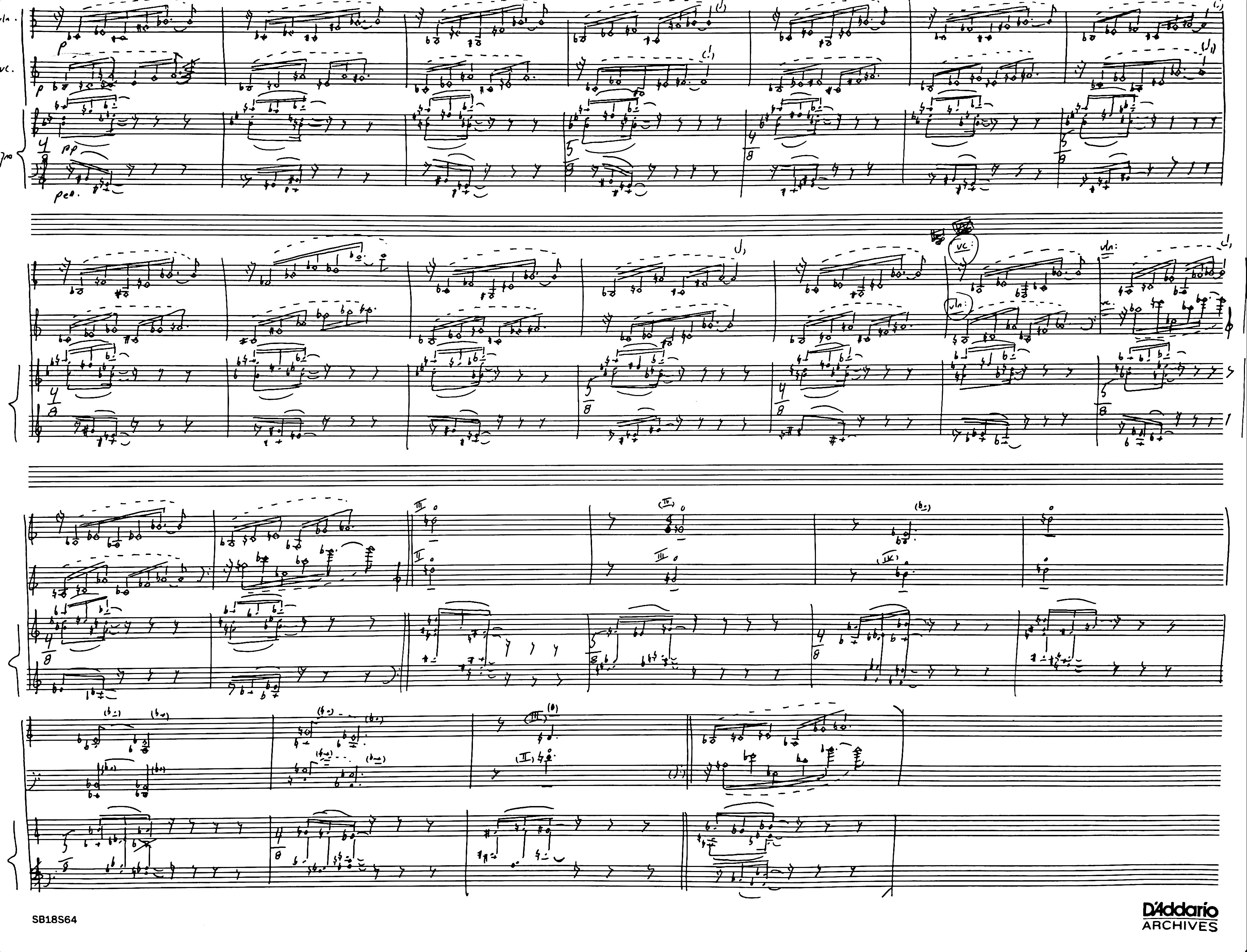︎︎︎ 2022.11.04.
A new work for solo vibraphone, ‘Sometimes I dream’, is now available for purchase through Project Schott New York.
Program Note
To what degree can a piece be conscious of its own trajectory? What if it were capable of dreaming its way forward, while its creator is preoccupied elsewhere? Perhaps, like in the novel ‘VALIS’ by Philip K. Dick, our own fictional creations can sometimes acquire autonomy and wreak havoc with our presence of mind. Sometimes I dream plays with memory and expectations, using repetition to provide a false sense of location. Would-be signposts are duplicated, mutated and deleted, leaving the listener little choice but to submit to the unpredictability of the road ahead.
I sketched the outlines of Sometimes I dream in 2015 during the prototyping phase for Occultations, commissioned by Avant Music Festival for the percussion trio TIGUE. It wasn’t until 2022 when I was rummaging through old folders that I rediscovered the work-in-progress. I was surprised and pleased by the harmonic combinations and naturalistic rhythmic flow and decided to turn it into a piece. Each movement builds on the previous one while collecting new items along the way.
Performance Note
The four movements of Sometimes I dream can be played as a set or separately. If played as a set, the interconnectedness of the materials is more readily apparent. If only one movement is to be played I would suggest No. 3 which is particularly suitable for standalone performance.
Aside from regular stage performance, I can imagine Sometimes I dreambeing performed in a three or four wall cyclorama (a room with curved walls) with subtle, slowly changing colored lighting and, if possible, fog machine(s), creating the illusion of infinite depth. The space should be big enough, and the lighting low enough, to ensure that the audience’s sense of direction is temporarily suspended. If fog is used, it should be circulated before the performance since fog machine(s) tend to make a fair bit of noise. The vibraphone may be amplified if desired, using two condenser or ribbon microphones on a stereo bar ca 2-3 feet above the instrument.
︎︎︎ 2022.07.30.
Pleased to announce the third installment in the archival series ‘Skyfiles’ entitled ‘Mall Music.’ The release collects 5 concert works written and recorded between 2010-2022. Available digitally (download and streaming on all major platforms) and as a made to order CDr for those who prefer a hard copy.
![]()
![]()
Liner Notes
Originally recorded in 2007, then released on 'Time Of My Life' in 2011, and then subsequently transcribed and published in score form in 2012, 'Abide With Me' has become a favorite among pianists who've played my music: R. Andrew Lee, Francois Mardirossian, Karl Larson, Kelsey Walsh, Jon Clancy... I was overjoyed when Timo told me he was planning a video/audio recording of the piece for his YouTube channel. During the covid 19 pandemic, we all became 'content creators'—but Timo's content was on a different level artistically and technically. The quality of the recording was so high that I asked if I might release it separately. The video is available to view here.
'Trio' was commissioned by John and Astrid Baumgardner for the 2011 Norfolk Chamber Music Festival. At the time, I was preoccupied with reading biographical materials about Ted Bundy and his victims, temporarily leaving the safety of my day to day life to splash around in that particular pool of unthinkable horrors. The project gave birth to the present composition, as well as a companion piece: 'Ted Bundy’s Requiem', based on recorded interviews with Bundy taken just before his execution in 1989.
The more abstract of the set, 'Trio' is dedicated to the memory of Bundy’s last victim, Kimberly Leach. It’s a very minimal concoction consisting of bits and pieces from Fauré’s 'Requiem' ('Lux Aeterna') and Rachmaninov’s 'Isle of the Dead', orbiting sequences distilled from transcriptions of a continuous modular synth patch. These are then captured and filtered by a barely detectable electronic effects chain, acting like a collective sustain pedal.
Originally premiered by Jessica Oddie, Clare Monfredo and Ariel Borensztein at the Music Shed, Norfolk, 'Trio' has also been performed by Red Light Ensemble (in a version with viola), Longleash and Light Matter Trio.
'The Caligari Project' was commissioned by Red Light New Music and premiered on December 13, 2010 at Roulette Intermedium, temporarily hosted at 20 Greene St in Manhattan. The piece formed a section of Red Light’s score for the classic silent film 'The Cabinet of Dr. Caligari' by Robert Wiene and included sections by Scott Wollschleger, Christopher Cerrone, Ted Hearne, Vincent Raikhel, Liam Robinson and others. It was composed in Stockholm, Sweden in the summer of 2010. The piece may be performed with the scene from the film (the kidnapping scene, 41’43”-47’18”) or without it.
I wrote 'Humble Servant' as a eulogy for Lisa McPherson, a Scientologist, who died in 1995. She had spent weeks in solitary confinement in room 174 at the Fort Harrison Hotel in Clearwater, FL, her physical and mental well-being in steady decline, when she was finally allowed to see a doctor. But it was too late, and she died in an ambulance on the way to the hospital. She was 36. 'Humble Servant' is part of a trilogy — consisting of 'God's Children' and the 'The Royal Scotsman' (recorded by Synthetic Love Dream on Galtta 020) — inspired by the subject. The music is a labyrinth of short phrases and melodies whose bittersweet qualities remind me of Lisa, or at least the Lisa I would have liked to know.
‘God’s Children’ is a meditation on the social pressures of religious zeal, a song-without-words taken from an unfinished monodrama about a Scientologist who died while under observation by ‘the church.’ Inside that ostentatious pressure chamber there must still be human beings, I thought, and I felt compelled to try to understand them.
It is the second in a set of three pieces dealing with the subject matter, preceded by 'Humble Servant' for solo percussion and ‘The Royal Scotsman’ for saxophone and electric guitar with optional piano and percussion. The three works may be performed back to back or separately.
'God's Children' is scored for two flutes, two clarinets, two alto saxes, two tenor saxes, vibraphone, electric piano (Rhodes) and piano. Oddly repetitive yet disorienting, the music spins ever inward, circling itself like a cat its tail. At the same time, I wanted the work to evoke a sense of true community, cleared of rank and status: a basic state of being, connecting with our core humanity.
A new work for solo vibraphone, ‘Sometimes I dream’, is now available for purchase through Project Schott New York.
Program Note
To what degree can a piece be conscious of its own trajectory? What if it were capable of dreaming its way forward, while its creator is preoccupied elsewhere? Perhaps, like in the novel ‘VALIS’ by Philip K. Dick, our own fictional creations can sometimes acquire autonomy and wreak havoc with our presence of mind. Sometimes I dream plays with memory and expectations, using repetition to provide a false sense of location. Would-be signposts are duplicated, mutated and deleted, leaving the listener little choice but to submit to the unpredictability of the road ahead.
I sketched the outlines of Sometimes I dream in 2015 during the prototyping phase for Occultations, commissioned by Avant Music Festival for the percussion trio TIGUE. It wasn’t until 2022 when I was rummaging through old folders that I rediscovered the work-in-progress. I was surprised and pleased by the harmonic combinations and naturalistic rhythmic flow and decided to turn it into a piece. Each movement builds on the previous one while collecting new items along the way.
Performance Note
The four movements of Sometimes I dream can be played as a set or separately. If played as a set, the interconnectedness of the materials is more readily apparent. If only one movement is to be played I would suggest No. 3 which is particularly suitable for standalone performance.
Aside from regular stage performance, I can imagine Sometimes I dreambeing performed in a three or four wall cyclorama (a room with curved walls) with subtle, slowly changing colored lighting and, if possible, fog machine(s), creating the illusion of infinite depth. The space should be big enough, and the lighting low enough, to ensure that the audience’s sense of direction is temporarily suspended. If fog is used, it should be circulated before the performance since fog machine(s) tend to make a fair bit of noise. The vibraphone may be amplified if desired, using two condenser or ribbon microphones on a stereo bar ca 2-3 feet above the instrument.
︎︎︎ 2022.07.30.
Pleased to announce the third installment in the archival series ‘Skyfiles’ entitled ‘Mall Music.’ The release collects 5 concert works written and recorded between 2010-2022. Available digitally (download and streaming on all major platforms) and as a made to order CDr for those who prefer a hard copy.
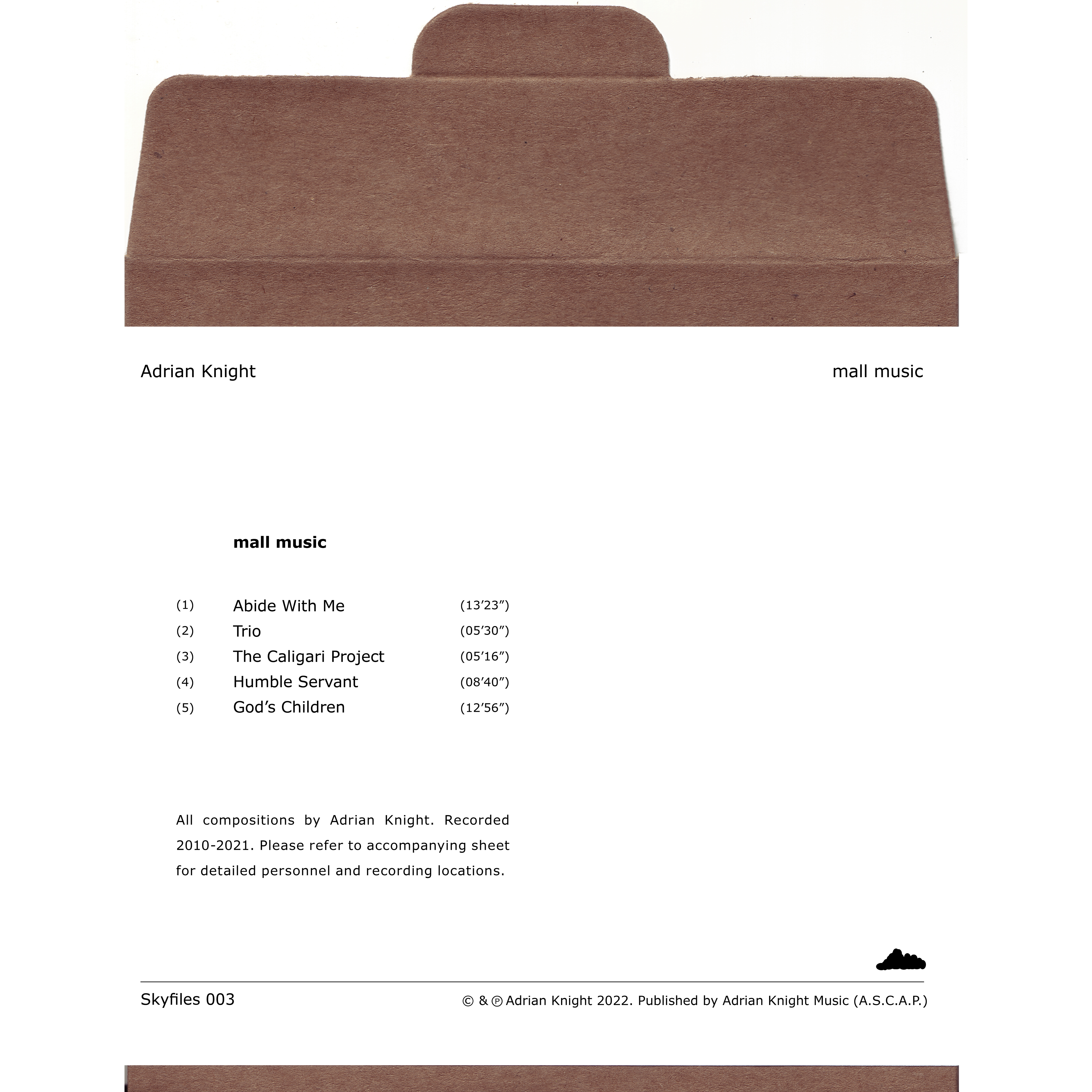

︎Buy CD-R (made to order)
︎Buy Digital
︎Spotify
︎Apple Music
Liner Notes
Originally recorded in 2007, then released on 'Time Of My Life' in 2011, and then subsequently transcribed and published in score form in 2012, 'Abide With Me' has become a favorite among pianists who've played my music: R. Andrew Lee, Francois Mardirossian, Karl Larson, Kelsey Walsh, Jon Clancy... I was overjoyed when Timo told me he was planning a video/audio recording of the piece for his YouTube channel. During the covid 19 pandemic, we all became 'content creators'—but Timo's content was on a different level artistically and technically. The quality of the recording was so high that I asked if I might release it separately. The video is available to view here.
'Trio' was commissioned by John and Astrid Baumgardner for the 2011 Norfolk Chamber Music Festival. At the time, I was preoccupied with reading biographical materials about Ted Bundy and his victims, temporarily leaving the safety of my day to day life to splash around in that particular pool of unthinkable horrors. The project gave birth to the present composition, as well as a companion piece: 'Ted Bundy’s Requiem', based on recorded interviews with Bundy taken just before his execution in 1989.
The more abstract of the set, 'Trio' is dedicated to the memory of Bundy’s last victim, Kimberly Leach. It’s a very minimal concoction consisting of bits and pieces from Fauré’s 'Requiem' ('Lux Aeterna') and Rachmaninov’s 'Isle of the Dead', orbiting sequences distilled from transcriptions of a continuous modular synth patch. These are then captured and filtered by a barely detectable electronic effects chain, acting like a collective sustain pedal.
Originally premiered by Jessica Oddie, Clare Monfredo and Ariel Borensztein at the Music Shed, Norfolk, 'Trio' has also been performed by Red Light Ensemble (in a version with viola), Longleash and Light Matter Trio.
'The Caligari Project' was commissioned by Red Light New Music and premiered on December 13, 2010 at Roulette Intermedium, temporarily hosted at 20 Greene St in Manhattan. The piece formed a section of Red Light’s score for the classic silent film 'The Cabinet of Dr. Caligari' by Robert Wiene and included sections by Scott Wollschleger, Christopher Cerrone, Ted Hearne, Vincent Raikhel, Liam Robinson and others. It was composed in Stockholm, Sweden in the summer of 2010. The piece may be performed with the scene from the film (the kidnapping scene, 41’43”-47’18”) or without it.
I wrote 'Humble Servant' as a eulogy for Lisa McPherson, a Scientologist, who died in 1995. She had spent weeks in solitary confinement in room 174 at the Fort Harrison Hotel in Clearwater, FL, her physical and mental well-being in steady decline, when she was finally allowed to see a doctor. But it was too late, and she died in an ambulance on the way to the hospital. She was 36. 'Humble Servant' is part of a trilogy — consisting of 'God's Children' and the 'The Royal Scotsman' (recorded by Synthetic Love Dream on Galtta 020) — inspired by the subject. The music is a labyrinth of short phrases and melodies whose bittersweet qualities remind me of Lisa, or at least the Lisa I would have liked to know.
‘God’s Children’ is a meditation on the social pressures of religious zeal, a song-without-words taken from an unfinished monodrama about a Scientologist who died while under observation by ‘the church.’ Inside that ostentatious pressure chamber there must still be human beings, I thought, and I felt compelled to try to understand them.
It is the second in a set of three pieces dealing with the subject matter, preceded by 'Humble Servant' for solo percussion and ‘The Royal Scotsman’ for saxophone and electric guitar with optional piano and percussion. The three works may be performed back to back or separately.
'God's Children' is scored for two flutes, two clarinets, two alto saxes, two tenor saxes, vibraphone, electric piano (Rhodes) and piano. Oddly repetitive yet disorienting, the music spins ever inward, circling itself like a cat its tail. At the same time, I wanted the work to evoke a sense of true community, cleared of rank and status: a basic state of being, connecting with our core humanity.
︎︎︎ 2022.01.24.
With the archival series 'Skyfiles’, I want to shift the focus away from the 'release' and redirect it toward the contents presented: a safe deposit box pulled out and opened, the various objects contained therein laid out in a display case with no obligation to form a unifying narrative. For the second volume in the series, “Life of the Party (Skyfiles 002),” I’ve assembled a set of pieces composed between 2011 and 2021, exploring a larger territory than its predecessor.
Adrian Knight – voice, piano, synth, treatments, engineering, mixing, mastering. Recorded 2011-2021 in Stockholm, New Haven, New York City and Guilford Sound, VT. All selections composed by Adrian Knight except ‘Golden Boy’ by David Lackner and Adrian Knight.
Soprano saxophone on 'Golden Boy' by David Lackner
'Dead in the Water' was originally commissioned by Margaret Lancaster. The version presented here is an arrangement for five monosynths.
![]()
![]()
With the archival series 'Skyfiles’, I want to shift the focus away from the 'release' and redirect it toward the contents presented: a safe deposit box pulled out and opened, the various objects contained therein laid out in a display case with no obligation to form a unifying narrative. For the second volume in the series, “Life of the Party (Skyfiles 002),” I’ve assembled a set of pieces composed between 2011 and 2021, exploring a larger territory than its predecessor.
Adrian Knight – voice, piano, synth, treatments, engineering, mixing, mastering. Recorded 2011-2021 in Stockholm, New Haven, New York City and Guilford Sound, VT. All selections composed by Adrian Knight except ‘Golden Boy’ by David Lackner and Adrian Knight.
Soprano saxophone on 'Golden Boy' by David Lackner
'Dead in the Water' was originally commissioned by Margaret Lancaster. The version presented here is an arrangement for five monosynths.

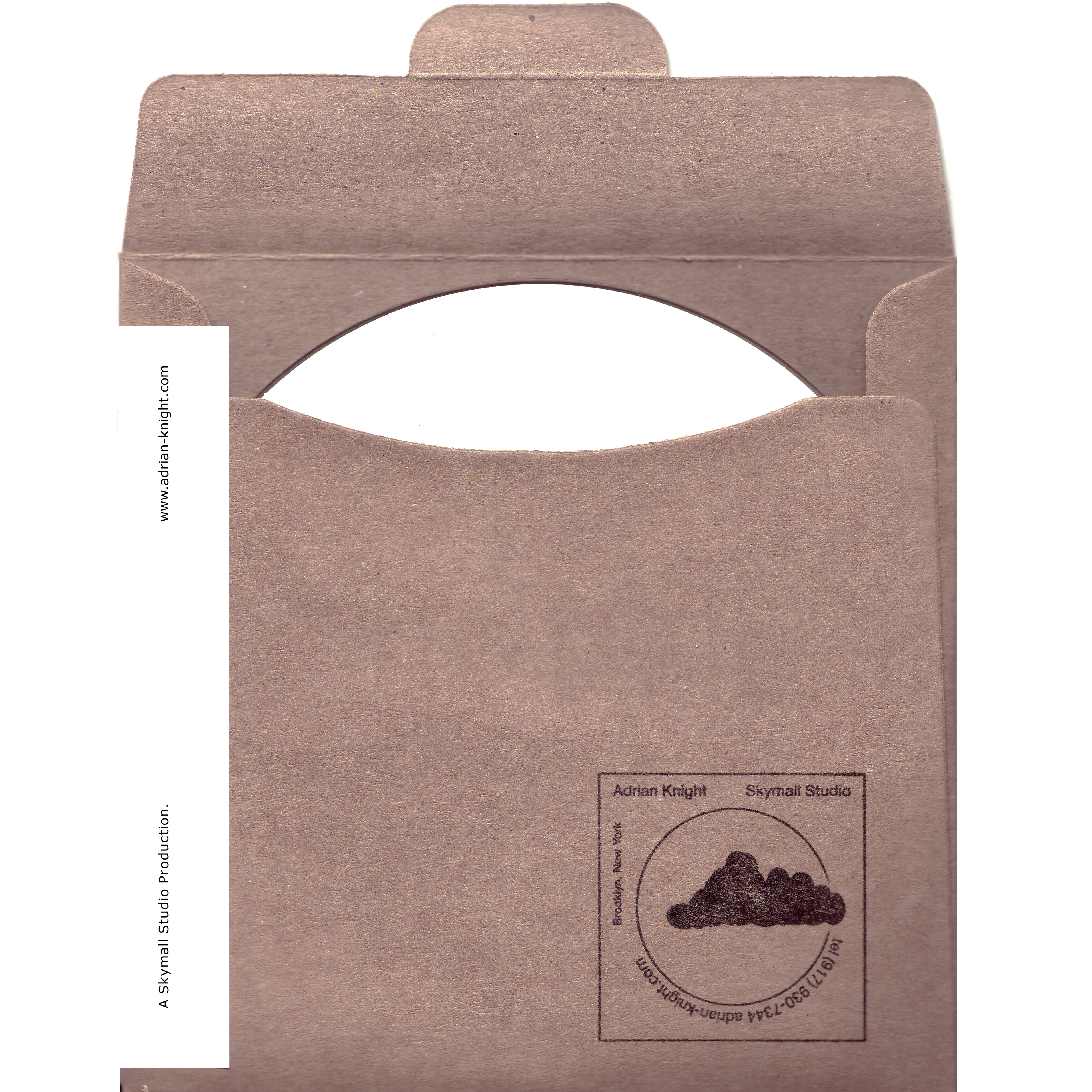
︎Buy CD-R (made to order)
︎Buy Digital
︎Spotify
︎Apple Music
︎︎︎2021.10.29.
Announcing ‘Damn the Flood’, a new full length cassette on Regional Attraction. Professionally-dubbed c52 with full color j-card in gold norelco box.
As with so many of my works, 'Damn the Flood' began as a series of prototypes: scaffolds of harmonies, rhythms and formal contours, a dimly neon-lit fog bank full of promise, the faintest outlines of some great discovery pulling me forward and inward. A circular maze of great ambiguity emerging, I felt strangely captivated and yet distant from my own creation: how did I end up here? And how do I proceed? How to get out? The resulting work was in answer to such questions, but it also carried the mutant gene of ambiguity out of the laboratory into the exalted chambers of 'the work'. The fleeting nature of running water and the timeless, malleable concept of an impending 'flood' were images that helped curate the selections made for the final version. Meanwhile, the prototypes receded back into oblivion, only to be rediscovered several years later.
In a way, the unearthed prototypes are like items lost in some mythical flood, preserved for future times by archivists. They are lenses through which 'the work' can be reappraised, redefined and contrasted. The sustained harmonies cruise undisturbed over endless bottomlands, gathering a multitude of instruments in its wake, gravitating toward a settlement. If in 'Damn the Flood' the findings have been consolidated, distilled and groomed, folded up to conserve time and space, the prototypes present those same findings unfurled, uncompressed. The sum total of these constituent parts yet again aligns with the flood metaphor: the materials thoroughly inspected, their possibilities probed, the maze flooded as the only means of escape.
The start and end points are by definition elastic. Captured here is the entire flood expedition, the prototypes naked in their infancy, the outcome incomplete in its ambition. A fragmentary assemblage of impressions, the work is as partial a vision of some great discovery as a clockface is to the expanse of time – caught in the drift, this too is destined to be dwarfed, absorbed and washed away.
‘Damn the Flood’ was commissioned by Post:Ballet and was premiered on March 3, 2017 at SOMArts, San Francisco as part of a dance performance choreographed by Robert Dekkers, with Brett Conway and Kar Will, and costumes by Christian Squires.
The work is in one continuous movement with five distinct harmonic areas. Throughout, melodic fragments from ‘Here’s That Rainy Day’ gently obstruct the chords, foreshadowing the unexpected cameo of an invisible (prerecorded) saxophone towards the end.
The work is part of a series of works written for The Living Earth Show with or without additional instruments: ‘Humble Servant’ (percussion solo), ‘Family Man’ (electric guitar and percussion with electronics), and ‘Damn the Flood’, culminating in the massive 12-movement ‘Idea to Life (Success Stories)’ (alto sax, electric guitar, percussion, Rhodes/synth), in which the formerly invisible David Lackner is now given the lead.
Andy Meyerson: vibraphone, percussion
Travis Andrews: electric guitar
Adrian Knight: Juno 6, Rhodes, electric guitar
David Lackner: saxophone
Matt Evans: gongs, bowls
Michael Advensky: percussion
Composed, produced, recorded & mixed by Adrian Knight.
Mastered by Travis Andrews.
Art by Tom Henry.
![]()
![]()
![]()
Announcing ‘Damn the Flood’, a new full length cassette on Regional Attraction. Professionally-dubbed c52 with full color j-card in gold norelco box.
As with so many of my works, 'Damn the Flood' began as a series of prototypes: scaffolds of harmonies, rhythms and formal contours, a dimly neon-lit fog bank full of promise, the faintest outlines of some great discovery pulling me forward and inward. A circular maze of great ambiguity emerging, I felt strangely captivated and yet distant from my own creation: how did I end up here? And how do I proceed? How to get out? The resulting work was in answer to such questions, but it also carried the mutant gene of ambiguity out of the laboratory into the exalted chambers of 'the work'. The fleeting nature of running water and the timeless, malleable concept of an impending 'flood' were images that helped curate the selections made for the final version. Meanwhile, the prototypes receded back into oblivion, only to be rediscovered several years later.
In a way, the unearthed prototypes are like items lost in some mythical flood, preserved for future times by archivists. They are lenses through which 'the work' can be reappraised, redefined and contrasted. The sustained harmonies cruise undisturbed over endless bottomlands, gathering a multitude of instruments in its wake, gravitating toward a settlement. If in 'Damn the Flood' the findings have been consolidated, distilled and groomed, folded up to conserve time and space, the prototypes present those same findings unfurled, uncompressed. The sum total of these constituent parts yet again aligns with the flood metaphor: the materials thoroughly inspected, their possibilities probed, the maze flooded as the only means of escape.
The start and end points are by definition elastic. Captured here is the entire flood expedition, the prototypes naked in their infancy, the outcome incomplete in its ambition. A fragmentary assemblage of impressions, the work is as partial a vision of some great discovery as a clockface is to the expanse of time – caught in the drift, this too is destined to be dwarfed, absorbed and washed away.
***
‘Damn the Flood’ was commissioned by Post:Ballet and was premiered on March 3, 2017 at SOMArts, San Francisco as part of a dance performance choreographed by Robert Dekkers, with Brett Conway and Kar Will, and costumes by Christian Squires.
The work is in one continuous movement with five distinct harmonic areas. Throughout, melodic fragments from ‘Here’s That Rainy Day’ gently obstruct the chords, foreshadowing the unexpected cameo of an invisible (prerecorded) saxophone towards the end.
The work is part of a series of works written for The Living Earth Show with or without additional instruments: ‘Humble Servant’ (percussion solo), ‘Family Man’ (electric guitar and percussion with electronics), and ‘Damn the Flood’, culminating in the massive 12-movement ‘Idea to Life (Success Stories)’ (alto sax, electric guitar, percussion, Rhodes/synth), in which the formerly invisible David Lackner is now given the lead.
Andy Meyerson: vibraphone, percussion
Travis Andrews: electric guitar
Adrian Knight: Juno 6, Rhodes, electric guitar
David Lackner: saxophone
Matt Evans: gongs, bowls
Michael Advensky: percussion
Composed, produced, recorded & mixed by Adrian Knight.
Mastered by Travis Andrews.
Art by Tom Henry.
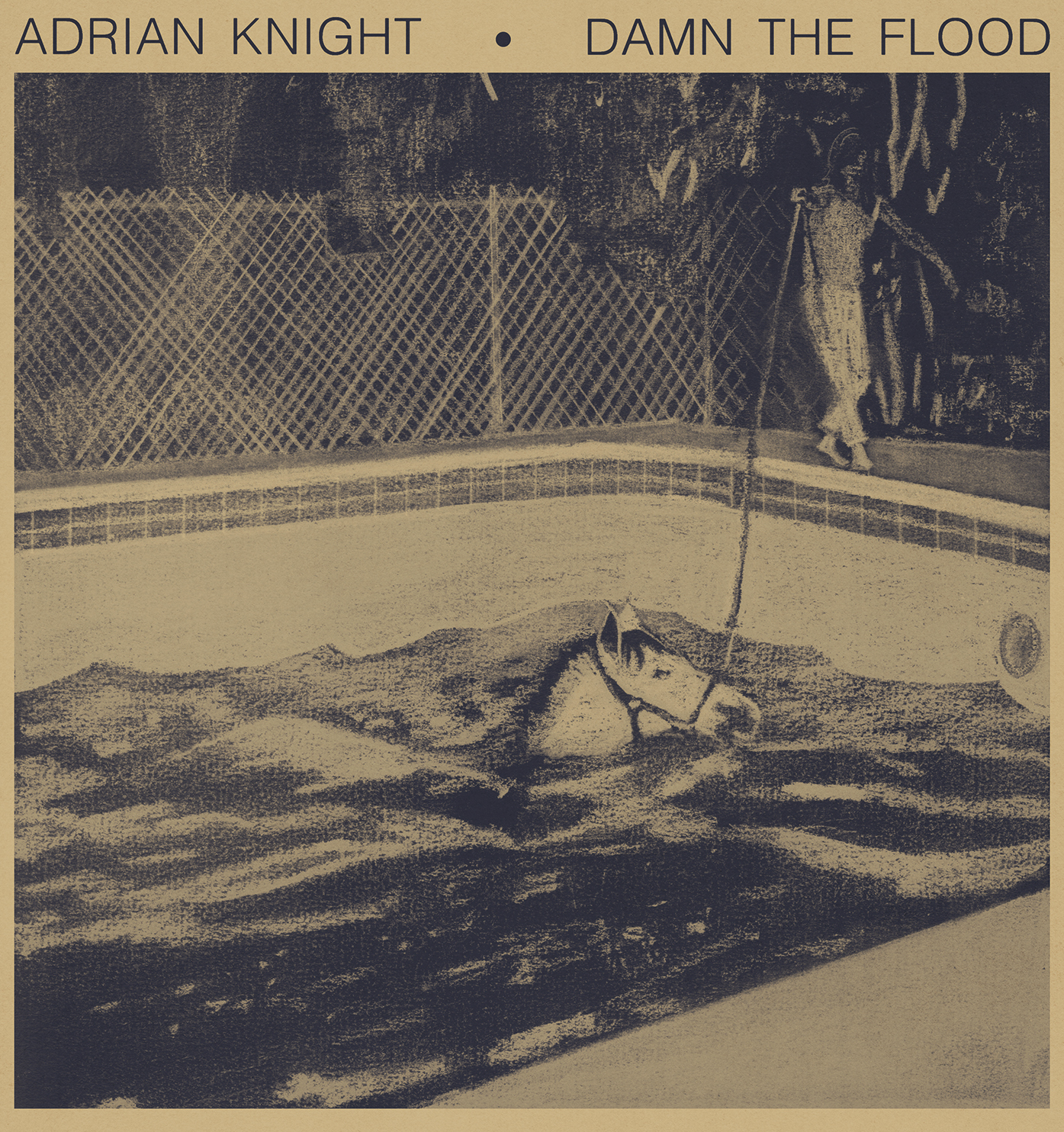
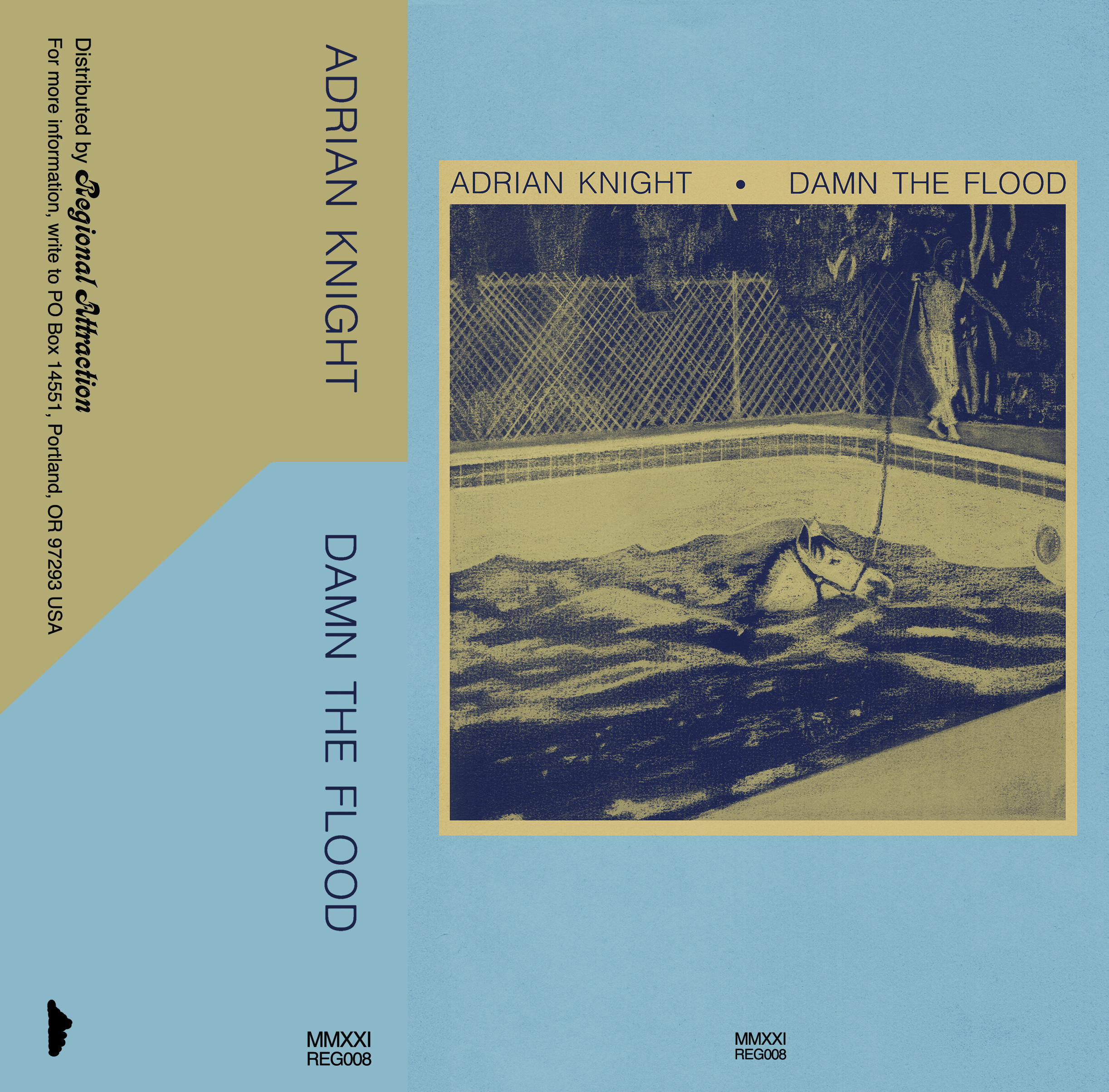
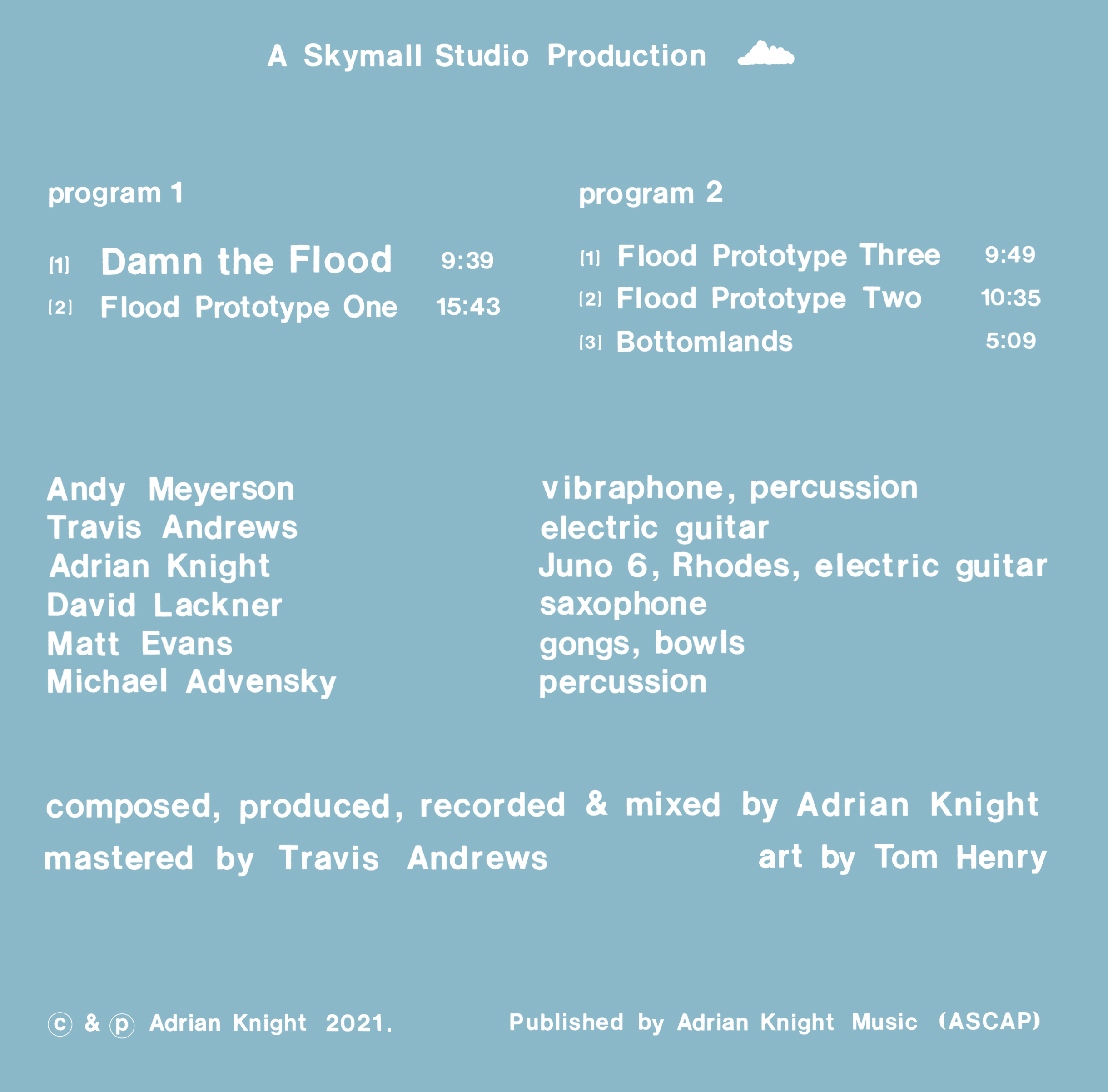
︎Buy CS
︎Buy Digital
︎Spotify
︎Apple Music
︎︎︎2021.06.22.
Part of an ongoing diaristic approach to recording, these ‘Nudes’ are intimate, private selections from my repository of unreleased materials. These are unedited, complete takes, performed on my 88-key Rhodes and then, with soft hands, subjected to gentle treatments. The recordings span several years and trace the evolution of my improvisations. Occasionally, an idea or shape may be excised and incorporated into a formal composition, but for the most part, I consider these recordings complete and self-sufficient. The release is the first installment in a new series, Skyfiles, and is available digitally and as CDrs (made to order).
Adrian Knight – Fender Rhodes, treatments, engineering, mixing, mastering. Written by Adrian Knight. Recorded October 7, 2017 (No. 10), April 18, 2018 (No. 11) and June 17, 2021 (No. 55) at Skymall Studio, Brooklyn.
![]()
![]()
Part of an ongoing diaristic approach to recording, these ‘Nudes’ are intimate, private selections from my repository of unreleased materials. These are unedited, complete takes, performed on my 88-key Rhodes and then, with soft hands, subjected to gentle treatments. The recordings span several years and trace the evolution of my improvisations. Occasionally, an idea or shape may be excised and incorporated into a formal composition, but for the most part, I consider these recordings complete and self-sufficient. The release is the first installment in a new series, Skyfiles, and is available digitally and as CDrs (made to order).
Adrian Knight – Fender Rhodes, treatments, engineering, mixing, mastering. Written by Adrian Knight. Recorded October 7, 2017 (No. 10), April 18, 2018 (No. 11) and June 17, 2021 (No. 55) at Skymall Studio, Brooklyn.
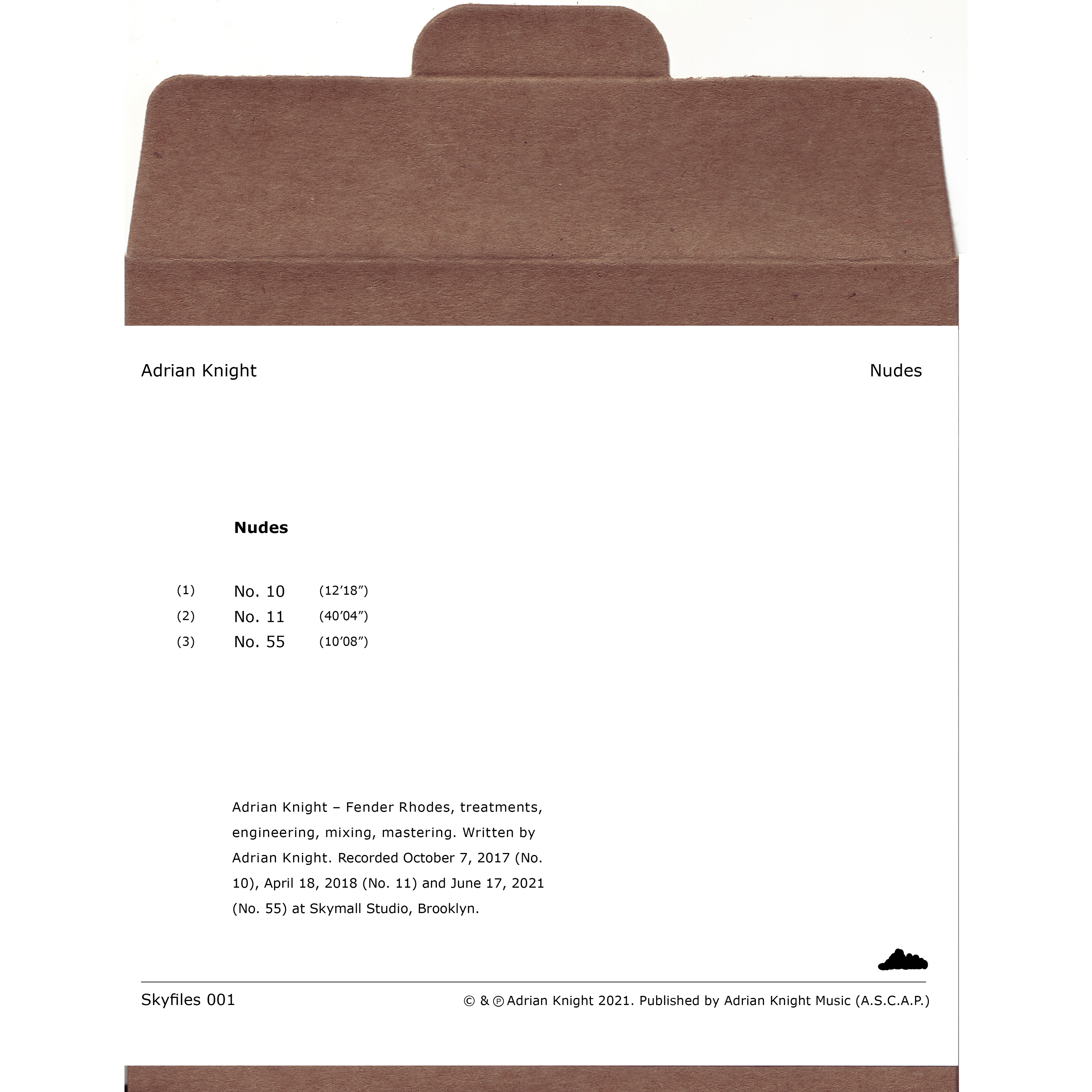
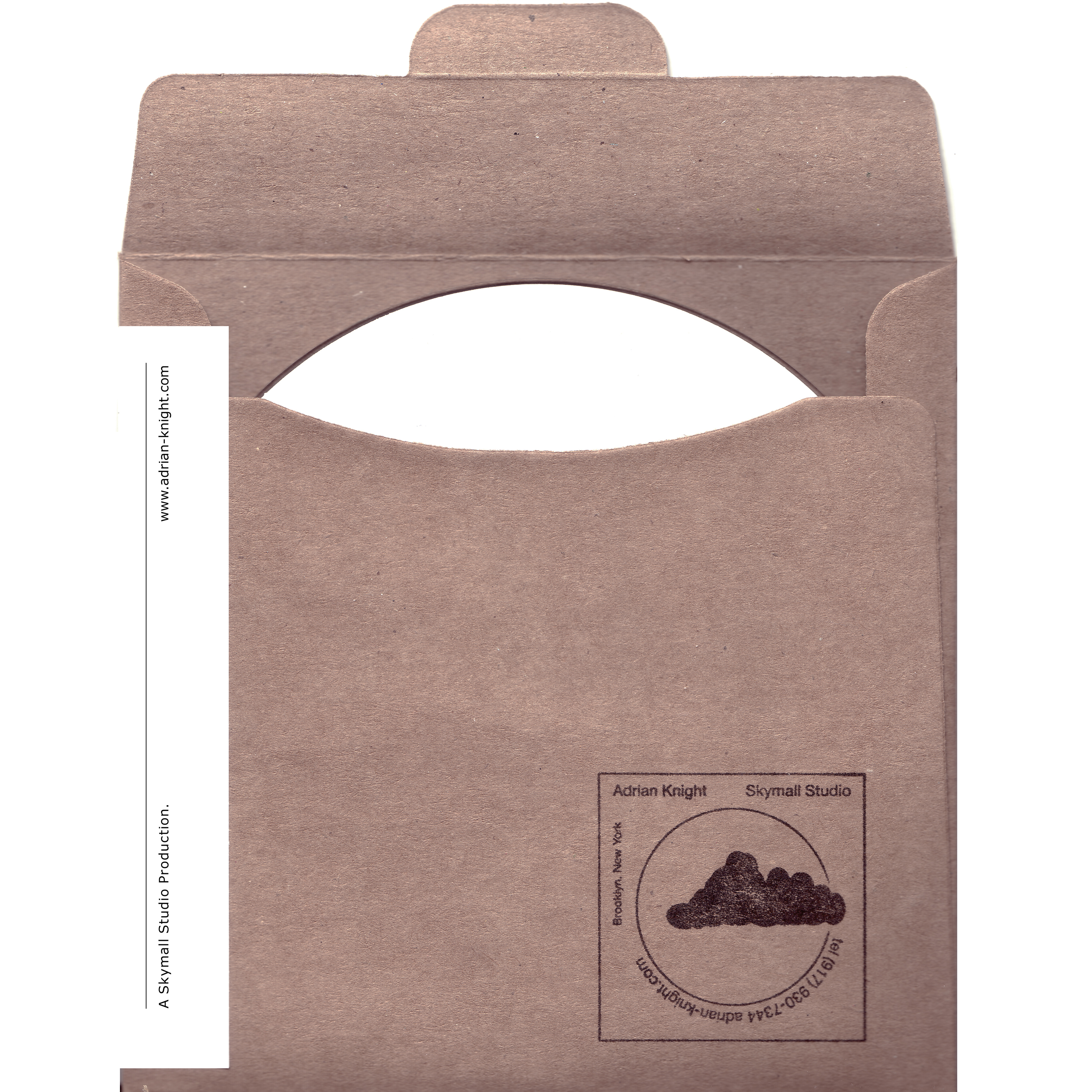
︎Buy CD-R (made to order)
︎Buy Digital
︎Spotify
︎Apple Music
